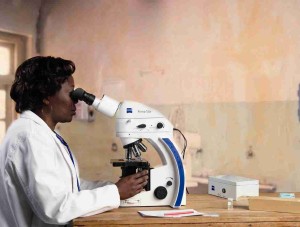With the Primo Star iLED, Carl Zeiss is introducing a new fluorescence microscope which enables the fast and reliable detection of tuberculosis. Together with FIND, the Foundation for Innovative New Diagnostics, which co-developed the microscope, the optics company will be presenting the system at the 39th World Union Conference on Lung Health in Paris from 17 to 20 October 2008.
 The Primo Star iLED fluorescence microscope from Carl Zeiss presented at the 39th World Union Conference on Lung Health in Paris.
The Primo Star iLED fluorescence microscope from Carl Zeiss presented at the 39th World Union Conference on Lung Health in Paris.
Carl Zeiss will supply the product at a particularly favorable price to the public health sector of the 22 high TB-burden countries. According to the World Health Organization (WHO), these countries account for 80 percent of all global tuberculosis cases.
Fluorescence microscopy is known to be up to 4 times faster than traditional brightfield microscopy for tuberculosis, and published studies are reporting 10% more sensitive detection. The Primo Star iLED offers these advantages of fluorescence microscopy, but in an inexpensive and rugged format.
Easy switching between fluorescence and brightfield microscopy makes the microscope suitable for all simple laboratory and routine applications. Thus, other infectious diseases such as malaria can also be detected.
One special feature of the microscope is that the fluorescence is excited with an energy-saving LED. Compared to traditional fluorescence excitation by mercury lamps, a LED has a very long lifetime, is inexpensive and energy-saving. In the event of power fluctuations or failure, the microscope can be battery-operated for several hours. Primo Star iLED with reflected light fluorescence illumination offers a significantly better signal-to-noise ratio and completely eliminates the risk of glare. The microscope is extremely robust and easy to use. “Fluorescence microscopy has been one of the core competencies of Carl Zeiss for the past 100 years. We are very proud to be able to contribute to the global fight against tuberculosis with this know-how," says Dr. Bernhard Ohnesorge, Vice President and General Manager of Carl Zeiss MicroImaging GmbH.
“We are pleased that our collaboration with Carl Zeiss enables us to provide the fluorescence microscope to low resource countries at a favorable price,” says Dr. Giorgio Roscigno, Chief Executive Officer of FIND. Based in Geneva, the Swiss-based Foundation supports the development and introduction of new and affordable diagnostic products to combat infectious diseases in developing countries.
Today, tuberculosis, along with HIV and malaria, tops the statistics of fatal infectious diseases. In view of the development of multi-resistant strains and HIV co-infection, the WHO estimates that tuberculosis will cause 30 million deaths in the next ten years. Today, already one in three persons is infected with the tuberculosis bacterium.